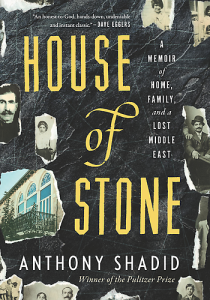 There were many reasons to pause and reflect on the sad passing of journalist Anthony Shadid in February 2012. At 43, he was only a few months my senior; he was a husband and a father of two young children; and he was a Pulitzer winner twice over (in 2004 and 2010, both times for his reporting on Iraq).
There were many reasons to pause and reflect on the sad passing of journalist Anthony Shadid in February 2012. At 43, he was only a few months my senior; he was a husband and a father of two young children; and he was a Pulitzer winner twice over (in 2004 and 2010, both times for his reporting on Iraq).
And there was this somehow stunning circumstance: Having placed himself in countless danger zones for his career—including Libya, where Colonel Muammar Qaddafi’s forces kidnapped, beat, and held him and three of his New York Times colleagues for six days just last year—it was, in the end, an asthma attack, evidently prompted by the dust and horses that were part and parcel of his final assignment, in that nightmare that is contemporary Syria, that felled him.
But as I read the first accounts of Shadid’s death and absorbed the many tributes that poured in, my sadness gained another tinge: anxiety. And that nervousness began as I read the final paragraphs of the Times’s report on the passing of its employee:
Mr. Shadid also had a penchant for elegiac prose. In the opening of a new book, “House of Stone,” to be published next month, he described what he had witnessed in Lebanon after Israeli air assaults in the summer of 2006:
“Some suffering cannot be covered in words,” he wrote. “This had become my daily fare as reporter in the Middle East documenting war, its survivors and fatalities, and the many who seem a little of both. In the Lebanese town of Qana, where Israeli bombs caught their victims in the midst of a morning’s work, we saw the dead standing, sitting, looking around. The village, its voices and stories, plates and bowls, letters and words, its history, had been obliterated in a few extended moments that splintered a quiet morning.”
I was not alone in my discomfiture. Andrew Silow-Carroll, editor-in-chief of New Jersey Jewish News, expressed my own sentiments well: “It’s a horrifying account, and I don’t doubt its veracity. Plus it comes from a forthcoming book, so it is timely. But it is either strange or telling that in an appreciation of a reporter who covered conflict throughout the Middle East, much of it Arab vs. Arab strife and civil war, the one example of his prose is an account of an Israeli attack on Arabs.” For its part, Shadid’s previous employer, The Boston Globe, eulogized him in a way that also made me queasy, depicting Israel as evil perpetrator when the journalist was wounded in Ramallah during the second Palestinian intifada in 2002.
House of Stone’s publisher released the book early, less than two weeks after Shadid’s death. I opened my review copy with some trepidation.
The rest of this essay is about what I found there. (more…)

